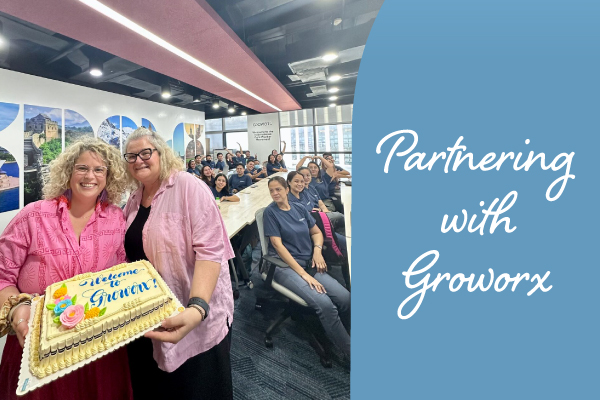The importance of training has taken on a new dimension with the changes that are sweeping the aged care industry along with the increasing demand for Consumer Directed Care. KYMBERLY MARTIN investigates how by adopting efficient work practices through education, appropriate training and mentoring leads to a more effective aged care workforce
As the head of one of Australia’s leading national registered training Organisations, Marcus Sellen believes adapting training to the needs of the client is paramount. “The strength of our training, our experience in this industry, and the respect from the industry for our work is what Selmar Aged Care Education Institute and aged care training is all about.”
According to Sellen, the new CDC services are changing the way residents are cared for which is a positive development for residents. The challenge for the industry is to adapt its business to the new CDC model. “The new training packages should help streamline Registered Training Organisations (RTOs) and TAFE training standards with clear guidelines on what the aged care industry requires now.”
Sellen believes the new training requirements will address one of the biggest shortcomings in the aged care sector about quality of training. “The current packaged does not involve minimal practical work placement experience. Students can study online but never set foot in a facility.”
The new training package requires students to work a minimum of 120 hours in one placement setting as a requirement to achieve qualification in order to be deemed competent to work in an aged care facility. The new requirement is expected to be endorsed in June 2015 and rolled out after that date.
In response to the new Consumer Directed Care initiatives Selmar Aged Care Education Institute will introduce new training resources in 2015 with a CHC (Community Health Care) Community Services Training Package in Certificate IV Leisure & Health.
This follows the need from major clients and lifestyle specialists in aged care facilities looking to build on their current qualifications. The training is particularly appealing to Certificate III qualified personal care staff wanting to move into the lifestyle space and direct care workers inquiring about up-skilling into these qualifications.
Selmar Aged Care Education Institute welcomes the changes coming in the disability sector in regards to training: 120 hours in the workplace is required at Certificate III and Certificate IV levels to ensure that people will have sufficient time to develop their workplace skills, knowledge and competence levels to manage disability.
As a result of the proposed changes, Certificate III and Certificate IV will change. Certificate IV in Aged Care Assistance becomes Certificate IV in Ageing Support. Certificate III in Aged Care becomes Certificate III in Individual Support: Certificate III (Disability), Certificate III (Ageing) and Certificate III (Home & Community).
“For those wanting to update and broaden their skillset Selmar Aged Care Education Institute will be ready to support community health with the proposed new training package,” Sellen says. “At Certificate III level we can offer campus training to specialists with the opportunity to advance their qualifications into these three fields.”
A more person-centred approach is at the core of the training that is specific to people in community and residential environments. Reputation is everything. “We are proud of the training practices we have built at Selmar with our dedicated team,” Sellen says.
One aspect of the recent branding campaign that produced a positive response from clients was its brand essence message – ‘Care Beyond Compliance’. This is printed on the back of the polo tops that students wear on placement. “Our message is carried through to the workplace. Selmar Aged Care Education Institute students clearly identified by their orange shirts and are given the practical aspects of the course. They are highly employable and have the edge over many other students who may have got their qualification without setting foot into a facility.”
Selmar Aged Care Education Institute recently announced new partnerships with Jewish Care (Victoria) in addition to multi-site providers and smaller individual providers in private and government.
To help consumers and employers make their own assessment in finding the right training provider, ASQA has published a tool: ‘Choosing a training or education provider.’
EDUCATION TRAINING GUIDE A ‘FIRST’
One of the key initiatives to come out of the Victorian aged care Southern Region Workforce Innovation Network (WIN) program has been the “Useful Educators’ Guide” Booklet. A first of its kind, this booklet gives industry guidelines and recommendations on all aspects of aged care training and has been generating a lot of interest particularly from RTOs.
“It has certainly established stronger relationships with RTOs such as Selmar Aged Care Education Institute who are prepared to work to the recommended guidelines,” says Bryan Quinn, Community/Human Resources Manager at The Village Baxter, Frankston. The booklet is being distributed to the aged care sector throughout Victoria and is expected to become more widely circulated as the word spreads about its relevance to the industry as a whole. “LASA’s Workforce Relations Taskforce has picked up on it and it was to be a topic of further discussion at our next meeting,” Quinn says.
The WIN program, which was funded by the Community Services and Health Industry Skills Council, was set up in 2013 to implement projects that addressed issues in the aged care workforce and involved training organisations, job seeking agencies and service providers.
According to Quinn, the Network looked at three areas: recruitment, training – “which is where the booklet is proving useful” – and the way forward when it comes to mentoring the next group of leaders.
“From our meeting last October with the Network participants it was decided that the group should continue with the ongoing initiatives that were implemented and also examine a number of emerging options for employers. For instance, being able to share staff and work towards developing consistent methods of training. We know if The Village Baxter and the facility nearby have compatible cultures, service and training standards and procedures the staffer can be recommended for employment by either organisation.” Quinn says sharing staff in this way has not happened formally before although previously staff could work at more than one facility.
“One of the recurring problems we have encountered involves differences in training standards between facilities and training organisations. So we need to be certain that the people working with us have a collective understanding of their role and a mutual standard of excellence particularly with organisations that share our philosophies.”
He said the concept has the potential to spread and The Village Baxter would be presenting these opportunities at the LASA Tri-State Conference in Albury, in February.
Quinn hopes other organisations may well want to jump on board, particularly some of the bigger operators. “It could be that a Job Services Agency may have 15 people wanting to work in aged care and putting it out there to aged care service providers with vacancies or who are prepared to be part of a joint recruitment process the JSA may be better able to try and match them. Equally, the ability for providers to share traineeships for potential new staff entrants creates additional employment opportunities.
“A few of the larger service providers have indicated they are happy having seen the model working here and would like to talk to JSAs / RTOs in other areas to establish a similar model. So what been established through the WIN program is now spreading – who knows where it might go?”
The mentoring part of the WIN program is also working well, he says. This specific leadership course involved potential leaders being assigned to an industry mentor on a monthly basis. The mentors can be CEOs or senior management from different service providers and organisations working with this next group of leaders coming through the industry. It could be a registered nurse wanting to become directors of nursing, or anyone currently in the industry who has been identified with leadership potential to give them the opportunity and ability to take the next step forward.
“Working with them and encouraging them to take part in the industry and work on their leadership skills so they can step up when the opportunity arises to take on that next level of management.”
As part of its three yearly accreditation appraisal due in January, The Village Baxter is required to prepare an assessment kit detailing facility operations. Quinn explains: “The kit has to include information that our work processes are innovative and driving care forward. Part of the application will explain that we are working with Selmar and 10 staff currently enrolled to up-skill themselves in certain areas and we expect this to be part of an ongoing program. One of the critical outcomes required is to show that your staff are adequately trained and properly equipped for their roles and are attending an accredited training program. Selmar Aged Care Education Institute fits the bill in this department.”
He said while Certificate III is a registered accredited training course there can be a big discrepancy in the quality of the training being delivered. “For example under Selmar Aged Care Education Institute you have to do 120 hours of on-site training for placement, and 156 hours of face- to-face course training in a class with a teacher. This course can take 12 months to complete. Some RTOs might offer a Certificate III course online that takes only a few months, so we would identify that the level of training with those RTOs is unlikely to equip a person with the necessary skills and ability.
“Whilst people are coming through with a qualification that purports to be of a comparable standard to a more intensive course, the actual outcomes for the person concerned can be poles apart and their training dollars have been spent without the ability to secure employment.
“We won’t accept anybody without the appropriate competency and while there is no obligation on anyone’s part to employ these people it really is a more of an obligation on us not to employ them. We need to be sure that people entering the industry are competent. That is why we are trying to get this educators guide adopted across the industry.”
An example that came out of the WIN forums that included industry stakeholders (service providers, RTOs, JSAs) was that some RTOs were unaware of the Active Service Model (ASM) and Consumer Directed Care (CDC) philosophies.
“When you are actively involved in working in community care, the ASM is one of the clear planks everybody works under and has been for a number of years. So to have people who are potentially training our staff without knowledge of the ASM was a bit concerning.” Quinn says some RTOs, but not all, have modified their training courses to accommodate the ASM which is a philosophy designed to assist people to live as independently as possible in the community.
“If you want to work with us you have to be on board with this information. This is something Selmar Aged Care Education Institute is completely on top of because the way training is trending now, with the growing awareness for willingness to work together, to enable the industry to work more effectively with each other makes for a brighter future.”
NEW COURSE FOR THOSE SHOWING LEADERSHIP POTENTIAL
Jewish Care (Victoria) is organising a new Diploma of Management course for staff currently working across the organisation who are in leadership positions or who have the potential for leadership roles within the organisation.
According to Sammantha Hewitt, Organisational Development Manager, People & Culture at Jewish Care, the course will focus on those who have been identified as having ‘talent’.
“We are reaching out to a cross-section of staff from different levels and different departments and offering them the opportunity to be up-skilled,” Hewitt says.
The course which has been developed in collaboration with the Selmar Aged Care Education Institute gets underway next year. It involves placing staff members with mentors to further encourage their leadership prospects. “We see them as emerging talent within our organisation and want to give them every opportunity to get up and running. What we are finding is a gap between this group and well qualified senior management and executives who have previously benefited in gaining development opportunities. It is the team leader and emerging leadership level that we are focusing on.”
Now it is the turn for the ‘emerging talent’ to get involved in a program what has been designed just for them. The successful participants, who were able to nominate themselves, needed to be supported by their managers, who in turn recognised their potential and signed them off for the program.
Hewitt said when the course was completed the graduates would have the opportunity to be more able to transition into different roles. “We have already established a leadership capability framework for entry to higher levels.”
The classes will run from February to December, 2015 and are capped at 15 participants. The course involves once a month classroom training combined with 20 hours a month homework, reading and assignments.
“We have identified with Selmar Aged Care Education Institute what the units should look like and we will customise those units with Selmar Aged Care Education Institute trainers,” Hewitt says.
To ensure participants are at the required level from a numeracy and literacy perspective to take on the Diploma, a language, literacy and numeracy [LLN] pre assessment was conducted on all applicants. Not all applicants met the required minimum entry standard and are now part of a different process to up-skill them. Those whose results were marginal were contacted and given feedback on the appropriate procedures. Hewitt explains: “We asked them what plans they had made to get support and mentorship to assisting them with gaining an LL&N.” Selmar Aged Care Education Institute is one of the few providers who require students to complete an LL&N prior to enrolment. “We have found there can be issues when it comes to a second language.”
A big ticket item at the moment is the rollout of the Aged Care Leadership Development project that encompasses the knowledge, skills and abilities that are required by leaders across the sector. Hewitt is one of three Victorians selected to champion this project.She has developed a program for Jewish Care Victoria to assess how aged care, community and disability services training link with the capabilities needed going forward to shape future strategies.
Hewitt has also created a one-page HR performance review document which she says is a first for the organisation and focuses on identifying and building an individual’s strengths.
“It moves away from the traditional type of ‘what are your values, what are your KPRs, your outputs? We found the previous appraisal did not have any traction and people did not want to discuss it because they were unable to see any merit in doing so. If people were not performing it was going down the performance management route anyway. What was needed to encourage any meaningful discussion was to focus on three personal achievements during the past six months – a stretch you could give yourself going forward.” Hewitt says this more integrated approach sets people challenges as well.
GETTING INTO PRACTICE
Taking care of 600 residents requires well trained staff. So for Simon Jedwab, Service Development Manager at Jewish Care, having the appropriate training module is essential.
“We are a community based service and our residents have unique needs, because they are elderly and also because of their heritage. We have set up specific policies and procedures around what we do and we wanted a model that provides the appropriate staff training that we can supervise and adapt to our requirements. “We decided on a model where we could partner with another training provider to provide the right mix.”
This is the first student class to be held at Jewish Care, and the first time the facility has worked with Selmar Aged Care Education Institute. Previously other providers were responsible for training existing staff. The Selmar Aged Care Education Institute students are studying at the facility’s education centre. There are currently 13 students enrolled in the Certificate III Aged Care and Community Care course that takes six months and comprises two days a week study and two days in placement on site. Students were able to visit the simulation lab at Selmar Aged Care Education Institute as part of the course program. The course offers practical and theory programs which Jedwab says is a different model to others where theory might come in at the end of the course or alternate with practical sessions. “We adopted the Selmar model because students get to talk about their experiences in the classroom.” At the end of the course each student will be interviewed and evaluated with a strong likelihood of employment. As well as having the opportunity to work in one of our facilities, graduates will also be offered roles in the community where Jedwab says there is a huge demand. There has been a positive response he says from students doing the course with some really outstanding participants. “Working with Selmar has run smoothly for us and we are planning to do other projects following this successful initiative.” More student courses are planned for 2015, with at least one in the first half and another in the second-half of the year. Another positive with the Selmar Aged Care Education Institute Certificate III course is having electives like medication training included. We are currently exploring a new course for the Jewish Care community. A course in Early Childhood Education is being developed to help fill positions in the community. “There are a lot of community-based early learning centres seeking staff so we are exploring traineeships and on the job training to meet the demand in our community.” A new pre-accredited training program is also being launched next year. Learn Local is designed for those keen to join the aged care workforce but who need to improve their language and digital literacy skills. The 10 week course will have an emphasis on aged care and will help to prepare people prior to enrolling in an aged care certificate course. “Because Selmar Aged Care Education Institute have strict literacy and numeracy standards, this will serve as an introductory program to help prepare them for the aged care course.” Jedwab adds that there is always a big demand for well trained staff. “And the better the training, the stronger the relationship becomes with our residents and clients.”
SKILL-UP
Ram Muslayah, director of nursing at AutumnCare St Leigh Private Nursing Home, would like to see the inclusion of an introductory module to basic pharmacology, anatomy and physiology in the Certificate IV aged care course. Muslayah says this course would better equip the Personal Care Assistants (PCAs) in regards to the administration of medication and knowledge regarding medical conditions of the residents under their care. He stresses the growing importance of staff up-skilling from Certificate III to Certificate IV and to have practical placement hours increased. “The training provided by Selmar Aged Care Education Institute is of great value and the PCAs trained by Selmar Aged Care Education Institute perform very well in the job.”
FOR MORE DETAILS about Selmar Aged Care Courses, please call: 1300 223 040 or go to www.selmar.edu.au
For work-based training enquiries contact: Melissa Quinn, Business Development Executive – Aged Care on 0420 997 157 or email: melissa.quinn@selmar.edu.au
For all other enquiries contact Kristel Stockton, Program Manager – Aged Care on 0424 157 533 or email: kristel.stockton@selmar.edu.au




